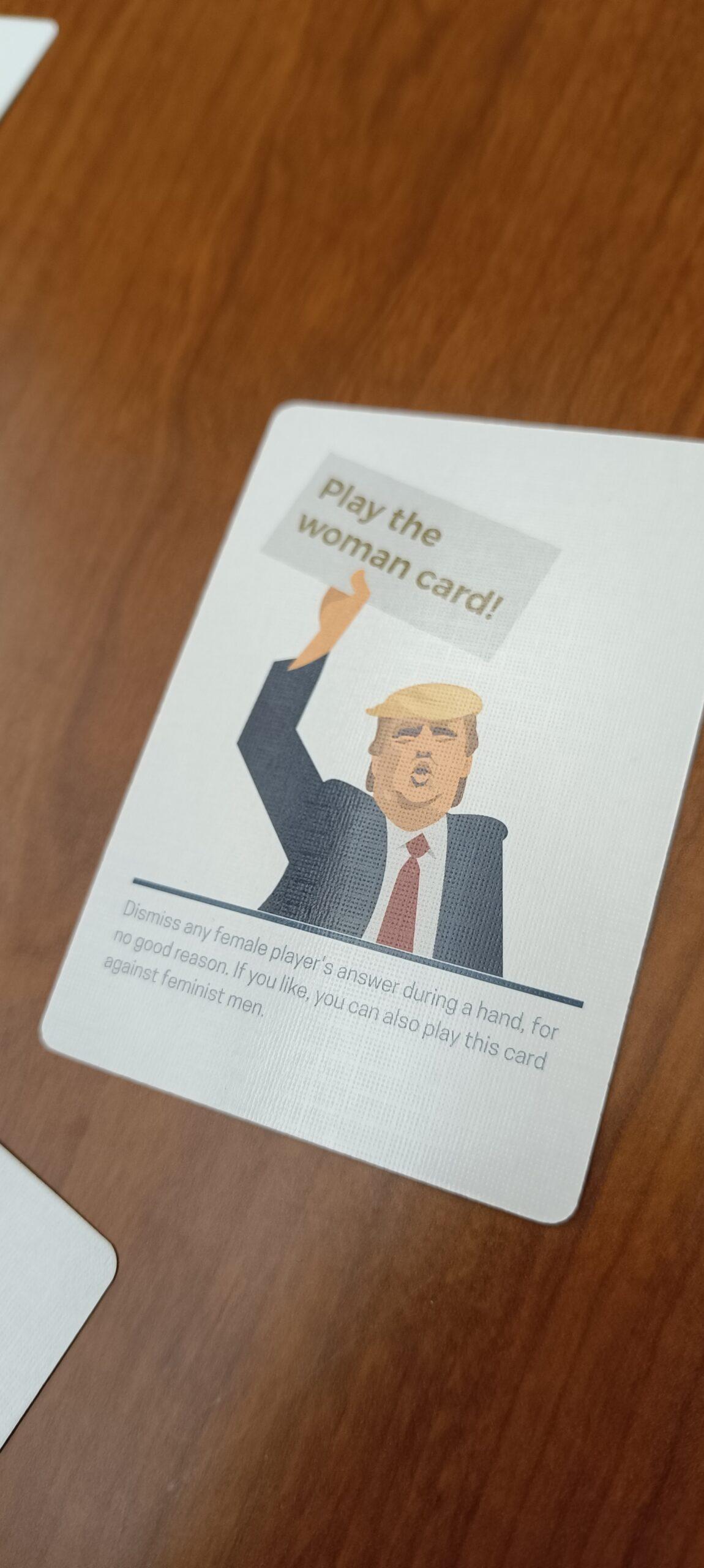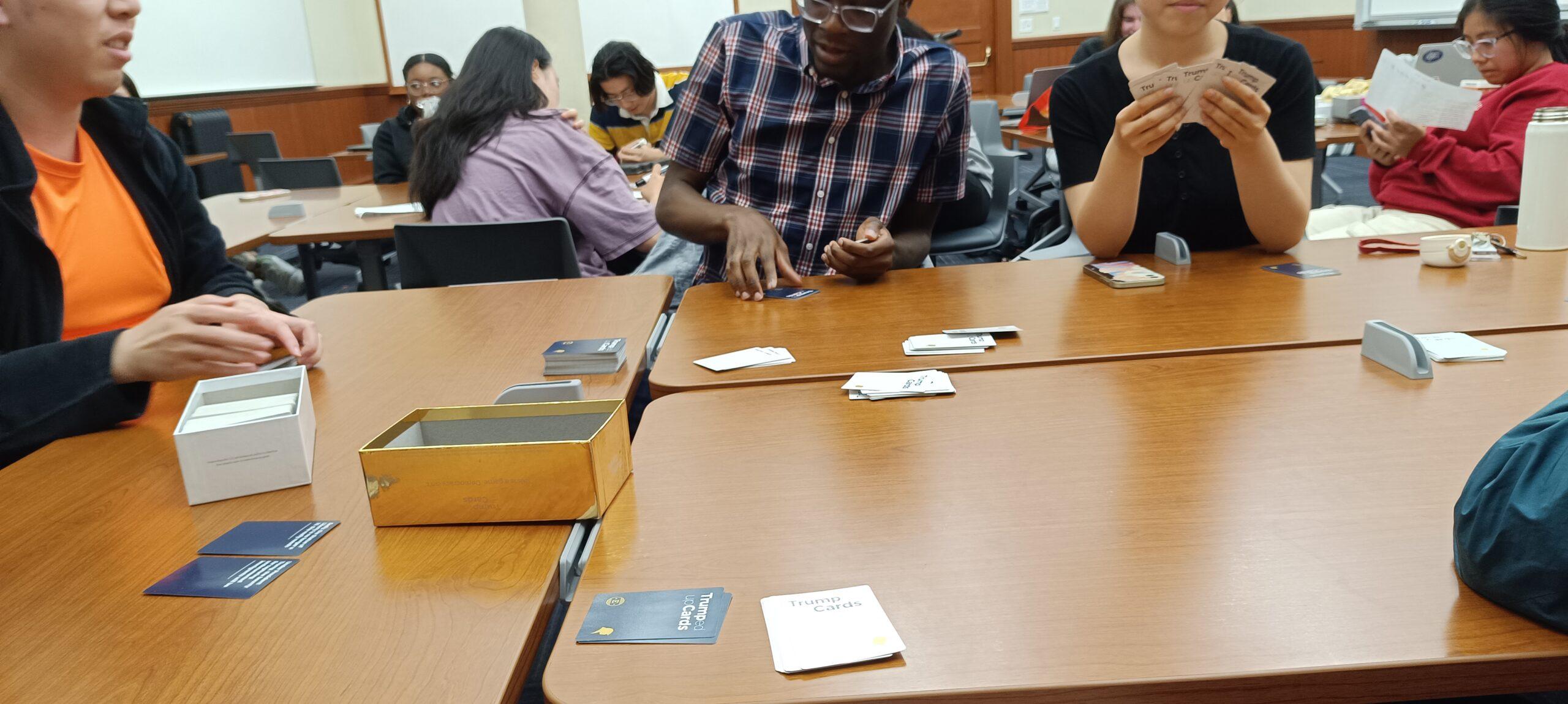For my critical play, I chose to play Trumped up Cards (TuC), an 18+ card game by Reid Hoffman. It’s basically just a Donald Trump-themed Cards Against Humanity (CaH) reskin with a couple unique mechanics, so I’ll focus on those in my critique. Firstly, though, judging is used in the game to decide which word or phrase (white card) best satisfies a prompt (black card). The white cards are submitted anonymously, a mechanic which prevents favoritism from the person whose turn it is to choose (the “card czar” in CaH, unclear what it’s called in TuC). However, when a card is chosen the person who played it has to speak up to claim the point. This means that anybody who plays anything particularly offensive then has to admit to having played it, creating a risky socially transgressive dynamic in CaH, and accomplishing basically nothing in TuC because none of the cards are particularly offensive to anybody except Trump. So, while the implementation details of TuC’s judgment mechanic help it avoid the worst potential of the concept, they also suffer from “cargo cult design” in that they default to borrowing concepts from CaH wherever they don’t have anything unique to add.

Of the two unique mechanics that TuC adds on top of CaH, both have problems that make them questionable design decisions. The most fun tweak that the game implements is that at any time, a majority of players can vote to change the rules of the game. While this is quite silly in a fun sort of way, and mostly mirrors how people treat board games anyway, it had unfortunate gameplay consequences in our playtest. In the first round, somebody voted for everybody except one person to get two points. This passed, because we wanted points, but in retrospect it’s probably not a good thing for healthy game balance or social engagement for that kind of thing to be possible. It is interesting, though, that merely adding something that people already do with games to the rules expanded the boundaries of what people felt encouraged to do. Despite the existence of house rules, nobody would ever vote for a new rule that everybody except one person gets two points in another game. While the mechanic was ill-advised, I think there’s an important takeaway in the importance of explicitly outlining in the rules what intended gameplay looks like, even when people would probably do it anyway, as it seems to encourage such a thing. We ended up deciding to vote for a new rule that mandated that the game was over, when we were done playing.
The other unique mechanic of TuC is the addition of “trump cards” that can be played at various times to have various effects. This might’ve been a cool change if the cards were better, but in this case I think that the game’s theme butted up against good game design a little too hard. Mechanics like being able to prevent a woman from playing (there was only one woman at the table when we played) or the wealthiest person going first import a little bit of systemic injustice from outside of the magic circle in a way that felt unsettling and icky. In the case of the pictured card, I suspect it’s effectively meant to be playable on anybody, but we all found it entertaining that by its explicit wording, I was immune as a non-binary individual. I suspect that this mechanic is a case of less being more, though. Another important takeaway, then: when modding, make sure that additions actually add something, instead of just making the gameplay experience worse.
Overall, Trumped up Cards is an unoriginal and unfunny adaptation of Cards Against Humanity that only has a negative effect on the gameplay experience. Beyond the criticisms I’ve made of the gameplay mechanics, the biggest issue is honestly just that the cards are simply not funny in the way CaH’s are. I suppose the final takeaway is this, then: for a game where most of the entertainment value comes from what’s written on the cards, your game lives or dies on writing quality.



